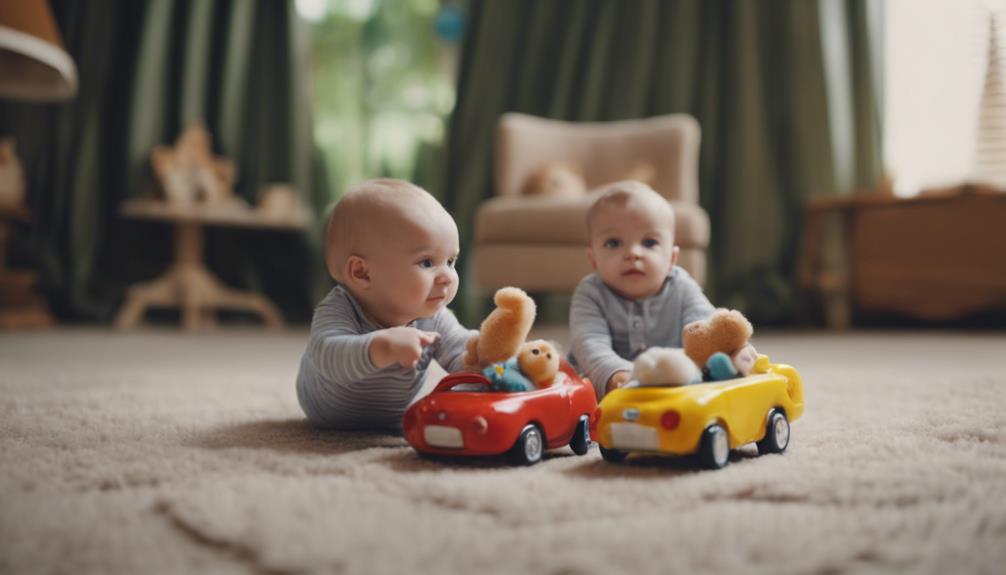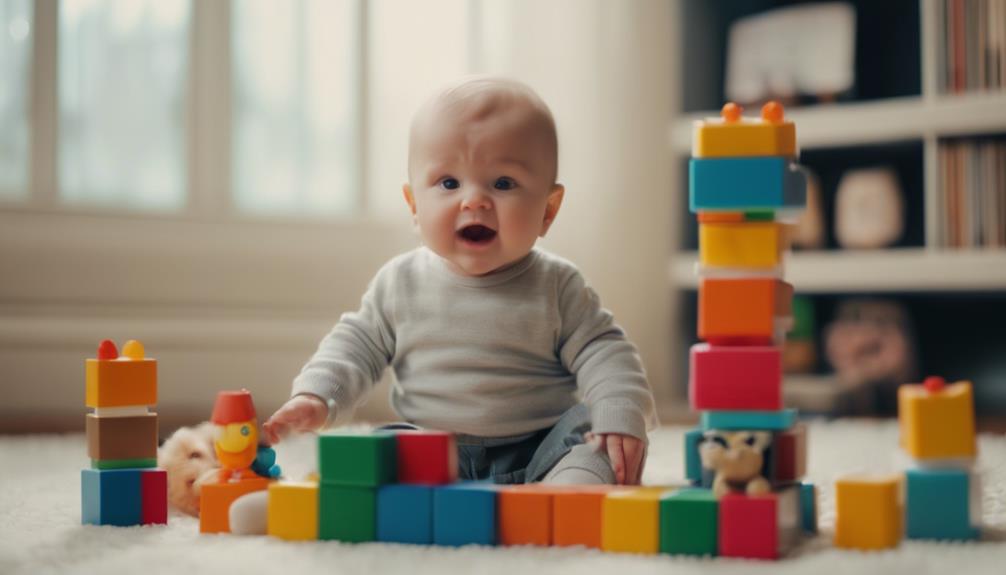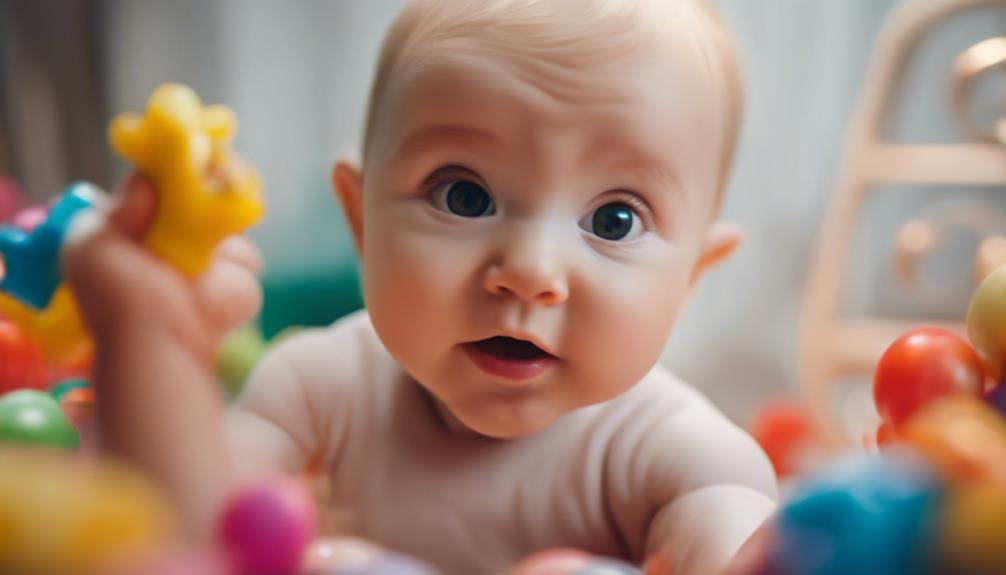Exploring the stages of baby brain development can help you better understand and support your child’s cognitive progress. Each phase, from object recognition to motor skill enhancement, plays a crucial role in your baby’s overall growth. You can promote brain development by engaging in activities like reading and sensory play. Encouraging social interactions and providing a secure environment for relationships also plays a key role in your baby’s development.
Motor skills are honed through play, which in turn aids cognitive growth. Keep track of behavioral milestones such as social smiles and babbling as they provide useful insights into your baby’s development. Learn more about nurturing your baby’s brain growth by exploring the fascinating stages outlined for you.
Key Takeaways
- Engage in activities like reading and playing music to enhance brain development.
- Provide sensory play opportunities to stimulate curiosity and cognitive skills.
- Foster responsive care and interactions to boost cognitive skills.
- Encourage social interactions for emotional development and communication skills.
- Support motor skill development through activities like tummy time and supervised play.
Phases of Baby Brain Development
During the phases of baby brain development, your little one undergoes significant growth in vision, hearing, motor skills, speech, and language. These key areas are vital in shaping your baby's cognitive abilities and overall development.
As a parent, understanding these phases is essential in providing the right support for your child's brain growth. Babies start by developing the ability to see and recognize objects, followed by improvements in hearing, allowing them to respond to name calls and various sounds around them.
Motor skills advance as they learn to control small muscles, aiding in grasping objects and eventually walking. Additionally, speech and language development begin, laying the foundation for communication skills.
Being aware of these phases can help you tailor activities and interactions to enhance your baby's brain development. Reading stories, playing music, and engaging in games are excellent ways to stimulate their growing brain.
Supporting Cognitive Skills

To enhance your baby's cognitive skills, consider engaging in activities that stimulate their curiosity and development. Reading books with repetitive patterns and rhymes can be beneficial, as it helps babies recognize sounds and patterns, supporting cognitive development.
Providing sensory play opportunities, such as playing with different textures or materials, can also stimulate their curiosity and cognitive skills.
Exposing your baby to music and rhythmic sounds is another way to enhance cognitive abilities. Music can help with memory, attention, and even language development in infants.
Additionally, engaging in responsive care and interactions is vital. When caregivers respond to a baby's cues promptly and sensitively, it fosters a sense of security and trust, which in turn boosts cognitive skills.
Encouraging social interactions with caregivers and other babies is equally important. These interactions can help babies learn about emotions, develop communication skills, and understand social cues, contributing to both cognitive and social skill development in infants.
Nurturing Social Development
Engage in interactive play and provide a secure environment to nurture your baby's social development, which involves learning to interact with others and forming emotional connections. As parents, your role is vital in fostering your baby's social skills. Responding to your baby's cues, such as smiles and gestures, helps them feel understood and secure. Through positive interactions, like playing peek-a-boo or imitating facial expressions, you can enhance their emotional development.
Here is a table summarizing key points on nurturing your baby's social development:
| Key Points | Description | Importance |
|---|---|---|
| Interactive Play | Engaging in activities that promote interaction and communication with your baby. | Stimulates social skills |
| Secure Environment | Providing a safe and supportive space for your baby to explore and interact with others. | Builds trust and confidence |
| Emotional Connections | Forming bonds through eye contact, smiles, and responsive caregiving. | Essential for social development |
| Early Social Skills Development | Encouraging behaviors like sharing, empathy, and taking turns to lay the foundation for healthy relationships. | Sets the stage for future social interactions |
Enhancing Motor Skills

Enhance your baby's motor skills through engaging activities that promote physical development and coordination. Motor skills encompass both fine motor skills, like grasping objects, and gross motor skills, such as rolling and crawling.
During your baby's first year, activities like tummy time, reaching for toys, and supervised play are vital in supporting their motor skill development. These skills are essential for physical coordination, which in turn influences cognitive development.
Throughout this period, your baby's motor skills develop rapidly, laying the foundation for future movements and abilities. Encouraging movement and exploration through play helps babies build strength and coordination in their motor skills.
Understanding Behavioral Milestones
You'll learn about key behavioral stages and effective parental support strategies in understanding your baby's development.
Recognizing faces and objects early on, social smiles, babbling, separation anxiety, and motor skill milestones are all essential aspects to observe.
Key Behavioral Stages
Understanding the key behavioral stages in baby brain development involves observing and recognizing important behavioral milestones. These milestones provide valuable insights into your baby's social, emotional, and cognitive growth.
Here are three key behavioral stages to look out for:
- Recognition of Familiar Faces and Objects:
Babies typically start showing interest in familiar faces and objects around 2 to 3 months of age. This early recognition helps them develop a sense of security and attachment.
- Imitation of Facial Expressions:
As your baby grows, they'll begin imitating facial expressions they see, such as smiling or sticking out their tongue. This behavior showcases their social and emotional development.
- Babbling and Communication:
Around 6 to 9 months, babies start babbling, which is an essential step towards language development. Encouraging this babbling helps them enhance their communication skills.
Parental Support Strategies
Parental support strategies play an essential role in recognizing and understanding key behavioral milestones in baby brain development. By engaging in activities that promote social interactions, such as playdates with other babies and children, you can help your baby develop essential social skills.
Monitoring your baby's progress in recognizing faces and objects within weeks can provide insights into their cognitive development. Additionally, being vigilant about signs of developmental delays is important for ensuring early intervention if needed.
Introducing mirrors to your baby's environment can aid in learning facial expressions and imitation, contributing to their understanding of emotions and social cues. Remember, seeking medical advice for any concerns regarding your baby's physical, behavioral, or social/emotional development is crucial.
Brain Development Gender Differences

Girls' and boys' brains exhibit subtle differences in development, impacting various cognitive functions and skills. These disparities can influence how language skills are acquired and how cognitive growth progresses in children.
Here are three key points to bear in mind regarding brain development gender differences:
- Size Discrepancy: Boys generally have slightly larger brains than girls, but girls may possess more sensitive senses early on, which can influence their perception of the world.
- Language Skills: Girls may demonstrate more advanced language abilities at specific developmental stages when compared to boys. These differences can affect how children communicate and express themselves.
- Cognitive Growth Rates: Gender variances can lead to disparities in the rate at which children mature in different aspects of brain development. Understanding these differences can help tailor support and interventions for optimal growth.
It is essential to be mindful of assumptions about gender that may impact how children's brains are perceived and supported throughout their development.
Frequently Asked Questions
What Are the 7 Stages of Brain Development?
You should know about the 7 stages of brain development: neural tube formation, cell proliferation, neural migration, synapse formation, pruning, myelination, and synaptic pruning. Each stage is crucial for shaping your baby's brain.
At What Week Is a Baby's Brain Fully Developed?
At week 40, a baby's brain is considered fully developed. It's an amazing process where growth and connections have reached a point of readiness for the world outside. Your baby's brain is a marvel!
What Role Do Parents Play in a Baby's Brain Development?
Just like a gardener nurturing a delicate seedling, you play an essential role in shaping your baby's brain development. Your interactions, care, and love create a strong foundation for healthy neural connections and lifelong skills.
How to Know Baby Brain Development?
To know your baby's brain development, observe milestones like improved vision, hearing recognition, and motor skills. Engage in activities such as reading and playing music. Factors like health, nutrition, genetics, and environment impact growth.
Conclusion
Now that you have a better understanding of baby brain development, you're ready to support and nurture your little one's growth. Remember, each phase is important and unique, so continue to provide love, encouragement, and stimulation to help them reach their full potential.
Stay tuned for more tips and insights on how to enhance your child's development. The journey of watching your baby grow and learn is just beginning!










